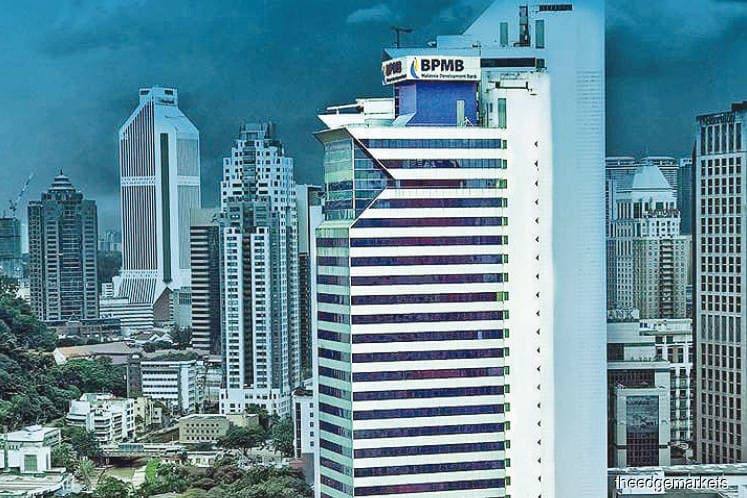
This article first appeared in The Edge Malaysia Weekly on December 31, 2018 - January 6, 2019
IN a recent advertorial, Bank Pembangunan Malaysia Bhd (BPMB) chief financial officer Afidah Mohd Ghazali, who is also acting president and CEO, said, “Let me assure you that BPMB’s fundamentals are strong. We will remain strong and focused in order to fulfil our nation-building role and deliver on our expected mandate.”
While Afidah may be rallying her troops for the new year, assuring them that all is okay, the fact is that there are deeply rooted issues at the bank, a wholly-owned unit of the Ministry of Finance.
Just a week ago, a news portal, quoting an auction advertisement in local newspapers, said Asian Broadcasting Network Sdn Bhd (ABN), formerly known as Nilamas Corp Sdn Bhd, and backed by Tan Sri K K Eswaran, was selling off assets via an auction to pay off creditors. Eswaran was known to have close ties with former prime minister Datuk Seri Najib Razak.
ABN’s debt was estimated at RM400 million last year, about half of which was owed to BPMB.
For its financial year ended December 2015, ABN suffered an after-tax loss of RM60.58 million from RM4.88 million in revenue. It had accumulated losses of RM227.85 million as at end-December 2015.
How BPMB, a development financial institution (DFI), sanctioned this loan is anyone’s guess.
But it does not end there.
It also extended financing to Integrated Nautical Resort Sdn Bhd and Garuda Suci Sdn Bhd — two companies linked to Indonesian businessman Tan Sri Peter Sondakh — which built and is operating the St Regis Langkawi and Langkawi International Convention Centre.
A check on the Companies Commission of Malaysia website reveals that Integrated Nautical Resort has a RM246.54 million facility with BPMB that is unsatisfied, while Garuda Suci has a RM57.75 million facility that is still due.
CCM data indicates that Integrated Nautical Resort and Garuda Suci are 40% controlled by Sondakh via Eagle Rock Capital (L) Bhd, 30% by Lembaga Pembangunan Langkawi (Lada) and 30% by Aset Tanah Nasional Bhd, a unit of the Ministry of Finance.
Integrated Nautical Resort and Garuda Suci have been suffering losses since 2013.
What is puzzling is that Sondakh is said to wholly own the Westin Langkawi Resort and Spa, located not far from St Regis, which would indicate that the Westin would be his priority.
According to certain quarters, the St Regis’ construction costs were astronomical, which would indicate that Sondakh had already made money on the construction, and that it was now no longer of interest to him.
Considering that Lada and the Ministry of Finance are not hotel operators, why would BPMB , a Malaysian DFI, lend money to an Indonesian businessman, let alone one who wholly owns another luxury hotel nearby?
Then, of course, there is the issue of BPMB’s 90% unit Global Maritime Ventures Bhd (GMV), which ended up wholly owning Syarikat Borcos Shipping Sdn Bhd, for which liquidators KPMG were appointed in end-December 2016.
Syarikat Borcos Shipping had a RM62.7 million facility with BPMB that is unsatisfied, and KPMG is understood to have disposed of as many as seven anchor-handling tugs controlled by the ailing company.
How is it that GMV, which is involved in dispensing shipping funds for BPMB, and which generally only takes associate stakes in companies to make sure that they are properly run, end up wholly owning the shipping company?
For its financial year ended December 2017, BPMB’s after-tax profit strengthened by almost 282% to RM199.4 million from RM52.2 million in FY2016. Its gross impaired loans, financing and advances ratio improved to 12.15% in FY2017 from 15.02% in 2016.
Nevertheless, to put things in perspective, the DFI writes off 12.15 sen for every RM1 that it gives out as borrowings, which is very high.
What is puzzling is that with 12.15% in gross impaired loans, BPMB’s annual report for FY2017 noted that the board met 27 times, while the Risk Management Committee met 29 times; Credit Committee, 28 times; Nomination and Remuneration Committee, 24 times; and Audit and Examination Committeem 16 times, which works out to a total of 124 meetings a year.
In total, the remuneration for BPMB in FY2017 was RM4.42 million, up almost 30% from RM3.41 million in 2016.
In contrast, another DFI, Small Medium Enterprise Development Bank Malaysia Bhd (SME Bank), held 42 meetings in all for its board, Nomination Committee, Remuneration Committee, Audit Committee and Risk Management Committee, and paid out RM2.65 million in total in FY2017.
If the directors met 124 times last year, excluding weekend and public holidays, it would mean that meetings were held every other day or more.
It is also no secret that the board of BPMB and its management do not see eye to eye.
Former BPMB president and CEO Shahruddin Zainuddin, who left the DFI in end-July this year, has sought legal redress against the development financial institution. His replacement will be the third CEO within three years.
Interestingly, BPMB’s communications department, its external communications outfit, regulator Bank Negara Malaysia, and even the Ministry of Economic Affairs — which now oversees the DFI — are not answering any questions with regard to BPMB.
So, what exactly is going on at BPMB?
Save by subscribing to us for your print and/or digital copy.
P/S: The Edge is also available on Apple's AppStore and Androids' Google Play.